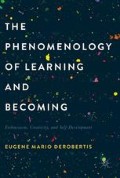Abstract
Chapter Three explores the issue of confidence as a focus of learning. This transition occurs against the background of the importance of confidence in supporting ongoing learning. The chapter takes its lead from Amedeo Giorgi’s notion of existential learning, deriving phenomenological clues as to its nature from the context of psychotherapeutic counseling. The chapter then presents original research on existential learning within the day-to-day process of skill acquisition. Given the fact that self-confidence is first learned during the early portion of the lifespan, a developmental point of view is subsequently adopted in the interest of attaining a broader understanding of existential learning. The results of these analyses will suggest that an adequate understanding of ongoing learning requires a fuller appreciation of the motivation to learn.
Access this chapter
Tax calculation will be finalised at checkout
Purchases are for personal use only
References
Adler, A. (1958). What life should mean to you. New York, NY: Capricorn Books.
Bandura, A. (1977). Social learning theory. Upper Saddle River, NJ: Prentice Hall.
Bandura, A. (1997). Self-efficacy: The exercise of self-control. New York, NY: Freeman.
Bandura, A. (2001). Social cognitive theory: An agentic perspective. Annual Review of Psychology, 52, 1–26.
Demir, T., Bolat, N., Yavuz, M., Karaçetin, G., Dogangün, B., Kayaalp, L. (2014). Attachment characteristics and behavioral problems in children and adolescents with congenital blindness. Archives of Neuropsychiatry, 51, 116–121.
DeRobertis, E. M. (2008). Humanizing child developmental theory: A holistic approach. New York, NY: iUniverse.
DeRobertis, E. M. (2012b). The whole child: Selected papers on existential-humanistic child psychology. Charleston, SC: CreateSpace.
Frankl, V. E. (1967). Psychotherapy and existentialism. New York, NY: Touchstone.
Fuller, A. R. (1990). Insight into value: An exploration of the premises of a phenomenological psychology. Albany: State University of N.Y. Press.
Giorgi, A. (1975). An application of phenomenological method in psychology. In A. Giorgi, C. Fischer, & E. Murray (Eds.), Duquesne studies in phenomenological psychology volume II (pp. 82–103). Pittsburgh: Duquesne.
Giorgi, A. (1999). A phenomenological perspective on some phenomenographic results on learning. Journal of Phenomenological Psychology, 30, 68–93.
Giorgi, A. (2009). The descriptive phenomenological method in psychology: A modified Husserlian approach. Pittsburgh: Duquesne University Press.
Horney, K. (1950). Neurosis and human growth: The struggle toward self-realization. New York, NY: W. W. Norton.
Jaffe, J., Beebe, B., Feldstein, S., Crown, C., & Jasnow, M. (2001). Rhythms of dialogue in infancy: Monographs for the society for research and child development. Hoboken, NJ: Wiley-Blackwell.
Keen, E (1976). Confrontation and support: On the world of psychotherapy. Psychotherapy, Theory, Research, and Practice, 13, 308–315.
Knowles, R. T. (1986). Human development and human possibility: Erikson in the light of Heidegger. Lanham, MD: University Press of America.
Kohut, H. (1977). The restoration of the self. Madison, CT: International Universities Press.
Maddux, J. E. (2002). Self-efficacy. In C. R. Snyder & S. J. Lopez (Eds.), Handbook of positive psychology (pp. 277–287). New York, NY: Oxford University Press.
McKenna, J. J. (2007). Sleeping with your baby: A parent’s guide to cosleeping. Washington, DC: Platypus Media.
Merleau-Ponty, M. (1962). The phenomenology of perception. New Jersey: The Humanities Press.
Merleau-Ponty, M. (1968). The visible and the invisible. Evanston, Ill: Northwestern University Press.
Minkowski, E. (1967). Imagination? In N. Lawrence & D. O’Connor (Eds.), Readings in existential phenomenology (pp. 75–92). Englewood Cliffs, NJ: Prentice Hall.
Pfänder, A. (1967). Phenomenology of willing and motivation. Evanston, Ill: Northwestern University Press.
Porter, R. H & Winberg, J. (1999). Unique salience of maternal breast odors for newborn infants. Neuroscience and Biobehavioral Reviews, 23, 439–449.
Reeb-Sutherland, B. C. & Tang, A. C. (2012). Functional specificity in the modulation of novelty exposure effects by reliability of maternal care. Behavioural Brain Research, 226, 345–350.
Ricoeur, P. (1978). The unity of the voluntary and the involuntary as a limiting idea. In C. E. Reagan & D. Stewart (Eds.), The philosophy of Paul Ricoeur: An anthology of his work (pp. 3–19). Boston: Beacon Press.
Schachtel, E. G. (1959). Metamorphosis: On the development of affect, perception, attention, and memory. New York, NY: Basic Books.
Shapiro, D. (1965). Neurotic styles. New York, NY: Basic Books.
Shapiro, D. (1981). Autonomy and rigid character. New York, NY: Basic Books.
Straus, E. W. (1966). Phenomenological psychology. New York, NY: Basic Books.
Thompson, N. R., Kennedy, E. A., & Kuebli, J. E. (2011). Attachment formation between deaf infants and their primary caregivers: Is being deaf a risk factor for insecure attachment? In D. H. Zand and K. J. Pierce (Eds.), Resilience in deaf children: Adaptation through emerging adulthood (pp. 27–64). New York, NY: Springer.
Vaglio, S. (2009). Chemical communication and mother-infant recognition. Communicative and Integrative Biology, 2, 279–281.
van Kaam, A. (1965). The addictive personality. Humanitas, 1, 236–246.
van Kaam, A. (1972). Envy and originality. New York, NY: Doubleday.
Varghese, F. T. (1988). The phenomenology of psychotherapy. American Journal of Psychotherapy, 42, 389–403.
Von Knorring-Giorgi, B. (1998). A phenomenological analysis of the experience of pivotal moments in therapy as defined by clients. (Unpublished Doctoral Dissertation, Université du Québec á Montréal).
Wampold, B. E. (2015). Humanism as a common factor in psychotherapy. In K. J. Schneider, J. F. Pierson, & J. F. T. Bugental (Eds.), The handbook of humanistic psychology: Theory research, and practice (2nd edition) (pp. 400–408). Thousand Oaks, CA: Sage.
Winnicott, D. W. (1965). The maturational process and the facilitating environment: Studies in the theory of emotional development. London: Hogarth Press.
Author information
Authors and Affiliations
Copyright information
© 2017 The Author(s)
About this chapter
Cite this chapter
DeRobertis, E.M. (2017). Existential Learning. In: The Phenomenology of Learning and Becoming. Palgrave Macmillan, New York. https://doi.org/10.1057/978-1-349-95204-5_3
Download citation
DOI: https://doi.org/10.1057/978-1-349-95204-5_3
Published:
Publisher Name: Palgrave Macmillan, New York
Print ISBN: 978-1-349-95203-8
Online ISBN: 978-1-349-95204-5
eBook Packages: Behavioral Science and PsychologyBehavioral Science and Psychology (R0)

